|
1. CBS Evening News Touts AP Poll on How Catholics Want Changes
Network evening newscasts rarely cite polls other than their own, but on Monday's CBS Evening News Bob Schieffer touted an AP/Ipsos poll which, he reported, found that "American Catholics hope whoever succeeds the Pope will make some changes in the church." Schieffer proceeded to cite majority support for allowing priests to marry and the ordaining of women as priests.
2. Gibson's Pal "Bitterly Disagrees" with Pope "On So Many Issues"
ABC's Charles Gibson admitted, during ABC's live coverage Monday of the moving of the late Pope's body to St. Peter's Basilica, that "I know of a woman who bitterly disagrees with him on so many issues, an American woman," but "when she saw him in St. Peter's Square burst into tears because she was so moved." Reflecting an emerging media theme that Catholics personally liked the late John Paul II despite his positions, Gibson asserted that "even for so many American Catholics who disagree with his positions on so many issues," the Pope had "a magnetism and a charisma that has transcended, really, positions that he has taken on issues."
3. Some Tag Papal Candidates as "Extreme" and "Ultra-Conservative"
The ideological labeling of a potential new Pope has begun. On Monday's Good Morning America, ABC's Charles Gibson asserted that Cardinal Joseph Ratzinger holds "extreme conservative views." CNN's Paula Zahn didn't even wait until the Pope had died before speculating about his replacement. On Friday night, before warning that it's "very likely that the next Pope will share Pope John Paul II's conservative stances on issues like abortion and the role of women in the church," she tagged Cardinal Francis Arinze as a "staunch conservative" and reported that "Cardinal Tettamanzi, the Archbishop of Milan, is also close to Opus Dei, the ultra-conservative Catholic group."
4. NBC's Holt on Pope: "Alienated," "Marginalized" and "Divided"
Hours before Pope John Paul II died on Saturday, NBC's Today devoted a segment to condemning his tenure for alienating, maginalizing and dividing the Catholic church in the U.S. Co-host Lester Holt charged that "some believe his unyielding stand," in refusing "to even discuss" opening the priesthood to married men and women, "alienated American Catholics." Holt insisted that "within the hierarchy, more progressive voices have been marginalized" and argued: "Pope John Paul II's legacy in the world's most powerful country may be that of a house divided. A man who changed the world, but in many ways, was unwilling to change his church."
5. Matthews Goes Into Rant About What New Pope Will "Have To" Do
MSNBC's Chris Matthews launched a rant Saturday night from Rome about how the Catholic church must approve of using condoms. Citing the affliction of AIDS in Africa, Matthew proposed: "I'm telling you, a new Pope is going to have to grab that one and grab it hard, and he's got to get to people and say, 'You may not like condoms, they may not be, but they're a lot better than HIV AIDS.'" Matthews acknowledged that "I'm not speaking as a journalist, I guess, for a second," as if it were unusual for him to offer a personal opinion, as he added that "I shouldn't be giving editorials." On Fox News Sunday, NPR's Juan Williams echoed Matthews: "There's one deficit in what John Paul II did, in terms of his legacy, you'd have to come back to this idea that in an age of AIDS, he was very slow to respond on the issue of condoms, on the issues of what rights gays should have in society."
6. Welch Shoots Down Couric's Admiration for European Work Ethic
Katie Couric's admiration for Europe shot down by Jack Welch. During an interview on Monday's Today with former GE Chairman Jack Welch, on to plug his new book, Winning, Couric complained that Americans are overworked and asked: "I mean is there something wrong with this picture? Are we too obsessed with work because the Europeans sure have a very different attitude don't they?" Welch retorted: "And their economy is some trouble. And I don't think people are obsessed with this in China right now and, and you just came back from China. You, you didn't see a lack of work ethic there, I'm sure."
 CBS Evening News Touts AP Poll on How CBS Evening News Touts AP Poll on How
Catholics Want Changes
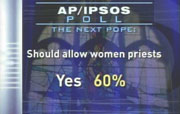 Network evening newscasts rarely cite polls other than their own, but on Monday's CBS Evening News Bob Schieffer touted an AP/Ipsos poll which, he reported, found that "American Catholics hope whoever succeeds the Pope will make some changes in the church." Schieffer proceeded to cite majority support for allowing priests to marry and the ordaining of women as priests.
Network evening newscasts rarely cite polls other than their own, but on Monday's CBS Evening News Bob Schieffer touted an AP/Ipsos poll which, he reported, found that "American Catholics hope whoever succeeds the Pope will make some changes in the church." Schieffer proceeded to cite majority support for allowing priests to marry and the ordaining of women as priests.
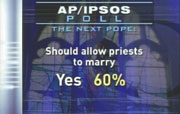 Schieffer announced on the April 4 CBS Evening News, over graphics displaying the three poll numbers he cited: "American Catholics hope whoever succeeds the Pope will make some changes in the church. An Associated Press poll out today says that 63 percent of American Catholics say the new Pope should give lay people a greater say in running the church; 60 percent say the new Pope should allow priests to marry; the same number support ordaining women as priests."
Schieffer announced on the April 4 CBS Evening News, over graphics displaying the three poll numbers he cited: "American Catholics hope whoever succeeds the Pope will make some changes in the church. An Associated Press poll out today says that 63 percent of American Catholics say the new Pope should give lay people a greater say in running the church; 60 percent say the new Pope should allow priests to marry; the same number support ordaining women as priests."
For the AP's story on the poll: story.news.yahoo.com
An Editor's Note: The vast majority of coverage of the Pope's impending death, and then after he passed away, has been positive or stuck to explaining church procedures, and has not portrayed the Pope through a liberal prism. One example of the glowingly positive assessments awarded the late Pope, how Wyatt Andrews concluded a Monday CBS Evening News story on how the Pope used the media to spread his message: "It's not that he played to the camera, his gift was to play past it. Perhaps, with the exception of Christ himself, no one reached the flock with greater impact."
There have been notable exceptions, and some of those are the stories and interviews cited in CyberAlert on Monday and today. As time passes and the networks, broadcast and cable, focus more on critic's analysis of John Paul II's record and the picking of the next Pope, the media's attitude will surely turn more critical and negative as they emphasize the concerns and spin of those who think the Catholic church is too conservative.
  Gibson's Pal "Bitterly Disagrees" with Gibson's Pal "Bitterly Disagrees" with
Pope "On So Many Issues"
ABC's Charles Gibson admitted, during ABC's live coverage Monday of the moving of the late Pope's body to St. Peter's Basilica, that "I know of a woman who bitterly disagrees with him on so many issues, an American woman," but "when she saw him in St. Peter's Square burst into tears because she was so moved." Reflecting an emerging media theme that Catholics personally liked the Late John Paul II despite his positions, Gibson asserted that "even for so many American Catholics who disagree with his positions on so many issues," the Pope had "a magnetism and a charisma that has transcended, really, positions that he has taken on issues."
The MRC's Jessica Barnes caught this comment from Gibson from about 11:15am EDT during ABC's hour-long 11am EDT coverage of the ceremony in which the late Pope's body was moved:
"This extraordinary pontificate of John Paul II. Certainly, I think, the most famous man in the world, the most recognized man in the world who has, even for so many American Catholics who disagree with his positions on so many issues, has a magnetism and a charisma that has transcended, really, positions that he has taken on issues, his personal appeal. I know of a woman who bitterly disagrees with him on so many issues, an American woman who when she saw him in St. Peter's Square burst into tears because she was so moved."
  Some Tag Papal Candidates as "Extreme" Some Tag Papal Candidates as "Extreme"
and "Ultra-Conservative"
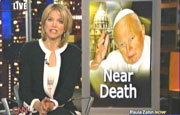 The ideological labeling of a potential new Pope has begun. On Monday's Good Morning America, ABC's Charles Gibson asserted that Cardinal Joseph Ratzinger holds "extreme conservative views." CNN's Paula Zahn didn't even wait until the Pope had died before speculating about his replacement. On Friday night, before warning that it's "very likely that the next Pope will share Pope John Paul II's conservative stances on issues like abortion and the role of women in the church," she tagged Cardinal Francis Arinze as a "staunch conservative" and reported that "Cardinal Tettamanzi, the Archbishop of Milan, is also close to Opus Dei, the ultra-conservative Catholic group."
The ideological labeling of a potential new Pope has begun. On Monday's Good Morning America, ABC's Charles Gibson asserted that Cardinal Joseph Ratzinger holds "extreme conservative views." CNN's Paula Zahn didn't even wait until the Pope had died before speculating about his replacement. On Friday night, before warning that it's "very likely that the next Pope will share Pope John Paul II's conservative stances on issues like abortion and the role of women in the church," she tagged Cardinal Francis Arinze as a "staunch conservative" and reported that "Cardinal Tettamanzi, the Archbishop of Milan, is also close to Opus Dei, the ultra-conservative Catholic group."
From Rome, during the 7am half hour of the April 4 Good Morning America, Charles Gibson reviewed possible papal candidates in the College of Cardinals. His comment on one of them: "German-born Cardinal Joseph Ratzinger is also mentioned, but his extreme conservative views and his age might be his undoing when votes are cast in the Sistine Chapel."
On the April 1 Paula Zahn Now Friday night on CNN, the MRC's Ken Shepherd noticed, Zahn applied some ideological labeling when previewing potential papal candidates:
"Cardinal Joseph Ratzinger, Cardinal Francis Arinze, Cardinal Dionigi Tettamanzi. These three names are unfamiliar, but Vatican watchers say they are among the frontrunners to be the next Pope. The College of Cardinals shocked the world in 1978 when they chose a Polish Cardinal, making Pope John Paul II the first non-Italian pope in more than 450 years. That shift away from the Italian domination in the Catholic Church has continued over the past 26 years. Today, the Church's strongest growth is in third world countries. More than half the world's Catholics live in Asia, Africa, Latin and South America. And many say it's only a matter of time before a pope comes from one of these regions.
"That could help the chances of Cardinal Arinze, the Vatican's fourth-ranking prelate, who is from Nigeria. If elected, he would only be the second African to head the church. Like John Paul II, Arinze is a staunch conservative. He's also one of the Pope's closest advisers.
"But some Vatican watchers say age may prove to be a factor, then an older Cardinal has the best chance to become the next Pope. Many believe the current papacy has lasted too long and that the next pontiff will be a transition pope. That thinking increases the prospects for Cardinal Ratzinger of Germany. He'll turn 78 in mid-April. As head of the church's Congregation for the Doctrine for the Faith, he has been a strong enforcer of the Pope's conservative positions on church doctrine.
"Others say there's a powerful sentiment to return to tradition and elect and Italian, which would make Cardinal Tettamanzi a favorite. Known for his diplomatic skills, Cardinal Tettamanzi, the archbishop of Milan, is also close to Opus Dei, the ultra-conservative Catholic group.
"Ultimately, the person who may have the most influence on who becomes the next Pope is John Paul II. He was responsible for appointing almost all of the 117 cardinals eligible to vote, making it very likely that the next pope will share Pope John Paul II's conservative stances on issues like abortion and the role of women in the church."
  NBC's Holt on Pope: "Alienated," "Marginalized" NBC's Holt on Pope: "Alienated," "Marginalized"
and "Divided"
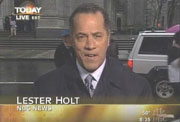 Hours before Pope John Paul II died on Saturday, NBC's Today devoted a segment to condemning his tenure for alienating, maginalizing and dividing the Catholic church in the U.S. Co-host Lester Holt charged that "some believe his unyielding stand," in refusing "to even discuss" opening the priesthood to married men and women, "alienated American Catholics." Holt insisted that "within the hierarchy, more progressive voices have been marginalized" and argued: "Pope John Paul II's legacy in the world's most powerful country may be that of a house divided. A man who changed the world, but in many ways, was unwilling to change his church."
Hours before Pope John Paul II died on Saturday, NBC's Today devoted a segment to condemning his tenure for alienating, maginalizing and dividing the Catholic church in the U.S. Co-host Lester Holt charged that "some believe his unyielding stand," in refusing "to even discuss" opening the priesthood to married men and women, "alienated American Catholics." Holt insisted that "within the hierarchy, more progressive voices have been marginalized" and argued: "Pope John Paul II's legacy in the world's most powerful country may be that of a house divided. A man who changed the world, but in many ways, was unwilling to change his church."
The MRC's Ken Shepherd caught the piece from Holt which aired during the fourth half hour, 8:30am EST in most markets, on the April 2 Today on Saturday which he co-hosted with Katie Couric. He read his opening and closing live as he stood outside a Catholic church in Manhattan.
Couric, putting in some weekend time, introduced Holt's story: "The American Catholic Church has been severely tested in recent years. And while Catholics around the world are united today, praying for their leader, the future is not altogether clear. NBC's Lester Holt has more on the state of the Catholic Church in America. Lester, good morning."
Holt began from streetside with a church in the background: "Good morning, again, Katie. And one of those often-mentioned issues of course: a shortage of priests. There are 66 million Catholics in this country, fewer than 45,000 priests to minister to them. Many of those priests are over the age of 55. Now under this Pope, two often-mentioned solutions -- admitting women to the priesthood and married men -- have proven to be non-starters."
Holt's taped segment began: "America's Catholic Church, this country's largest single religion. More than 66 million call themselves Catholic, yet only 29 percent attend Mass regularly. Recent polls show a flock profoundly ill at ease. One major reason: The hierarchy's handling of one of the worst crises ever to befall the modern Catholic Church: revelations about sexual abuse of children by priests, and efforts by bishops to cover it up. It's not just bad headlines. For three decades, the ranks of American priests have become alarmingly thin. Father Donald Wiskowski, a new priest, one of America's few. But because of a shortage of priests, he's pastor in charge of two separate churches."
Father Wiskowski: "It sounds hopeless, but it's kind of an exciting time to be a priest."
Holt: "The number of priests has been dropping sharply for three decades." [Text on screen: U.S. priests in 2003: 43,634; in 1965: 58,632] And many of those that remain are succumbing in to old age. More than 3,000 parishes have no resident priest at all. While a majority of American Catholics believe the priesthood should be open to married men and women, the Pope refused to even discuss it. Some believe his unyielding stance alienated American Catholics."
Father Robert Silva, National Federation of Priests' Councils: "We are a people that are self-determining, and, you know, and democratic. So we need to somehow or another, balance these two forces."
Holt: "But that balance is becoming ever more difficult to find. Influential conservative bishops in the U.S. -- most appointed by Pope John Paul II -- oppose birth control, abortion, and condemn homosexuality, leaving them at odds with many in the flock. Within the hierarchy, more progressive voices have been marginalized."
R. Scott Appleby, University of Notre Dame: "There's more of a sense of a new generation of priests for example, who describe themselves as John Paul II priests. There's an edge to it. It doesn't breed unity; it breeds conflict and division.
Holt, back live on the Manhattan street: "Pope John Paul II's legacy in the world's most powerful country may be that of a house divided. A man who changed the world, but in many ways, was unwilling to change his church. And it's worth noting that many of the parish functions that were traditionally overseen by priests, these days are overseen by married men and women as deacons and parish administrators. Certainly this issue of admitting them to the priesthood is one that is likely going to confront a new pope sooner rather than later. Katie?"
For NBC's picture and bio of Holt: www.msnbc.msn.com
  Matthews Goes Into Rant About What New Matthews Goes Into Rant About What New
Pope Will "Have To" Do
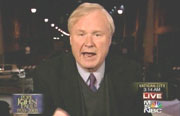 MSNBC's Chris Matthews launched a rant Saturday night from Rome about how the Catholic church must approve of using condoms. Citing the affliction of AIDS in Africa, Matthew proposed: "I'm telling you, a new Pope is going to have to grab that one and grab it hard, and he's got to get to people and say, 'You may not like condoms, they may not be, but they're a lot better than HIV AIDS.'" Matthews acknowledged that "I'm not speaking as a journalist, I guess, for a second," as if it were unusual for him to offer a personal opinion, as he added that "I shouldn't be giving editorials." On Fox News Sunday, NPR's Juan Williams echoed Matthews: "There's one deficit in what John Paul II did, in terms of his legacy, you'd have to come back to this idea that in an age of AIDS, he was very slow to respond on the issue of condoms, on the issues of what rights gays should have in society."
MSNBC's Chris Matthews launched a rant Saturday night from Rome about how the Catholic church must approve of using condoms. Citing the affliction of AIDS in Africa, Matthew proposed: "I'm telling you, a new Pope is going to have to grab that one and grab it hard, and he's got to get to people and say, 'You may not like condoms, they may not be, but they're a lot better than HIV AIDS.'" Matthews acknowledged that "I'm not speaking as a journalist, I guess, for a second," as if it were unusual for him to offer a personal opinion, as he added that "I shouldn't be giving editorials." On Fox News Sunday, NPR's Juan Williams echoed Matthews: "There's one deficit in what John Paul II did, in terms of his legacy, you'd have to come back to this idea that in an age of AIDS, he was very slow to respond on the issue of condoms, on the issues of what rights gays should have in society."
Matthews also predicted: "I think the church will lean to the left in the new papacy on issues like Third World debt, and all I can say is look out, Paul Wolfowitz, because not only is the church not neo-con and not pro-war and certainly didn't support the war in Iraq, but they're coming for the scalps of people who believe that the rich countries of the world can practice democratic capitalism and not really look out for the poor countries."
Matthews co-hosted MSNBC's Saturday night, April 2, coverage from Rome from 6-9pm EST with Keith Olbermann holding down the duties from New Jersey. At 8:13pm EST, with a dark Rome behind him, Matthews launched this rant, as corrected against the closed-captioning by the MRC's Brad
Wilmouth:
"Gay relationships, I think there'll be more tolerance for the reality of the gay condition, the orientation, less than it's a sense of anything more than the way God made you, you were made that way. How you behave is up to you, but God made you that way. I think we're moving toward that some day. But I think a couple of these issues in the near future, I mean, in the next 30, 40 years, I think you're going to see the issue of collegiality and local control and local decision-making about some of these disciplinary issues, I think, are going to have to be discussed, and I think the papability who wins will likely be the guy who says let's look at some of these, let's discuss them.
"Third World debt's another issue, although the church can't move to the left on sexual or moral issues of that kind, it can move very hard to the left on those Dorothy Day issues like, 'Why do poor people have to be ignored by people who have money?' 'Who's going to wake up North America and Europe to the fact there's millions of people dying out there who need some help and it's a moral responsibility, it's a sin of omission not to do anything about it?' Popes have to speak out on that, priests to be activated need to have that as a cause. Nobody wants to become a young priest now and not care about poor people. What's the point? You've got to join the priesthood to help poor people. And I think the church will lean to the left in the new papacy on issues like Third World debt, and all I can say is look out, Paul Wolfowitz, because not only is the church not neocon and not pro-war and certainly didn't support the war in Iraq, but they're coming for the scalps of people who believe that the rich countries of the world can practice democratic capitalism and not really look out for the poor countries. I really do think you're going to see a lot of action on the economic left in the new papacy."
Olbermann: "Boy, and if it's, as you mentioned, Cardinal Hummes of Brazil, boy, that's the message right there, or Cardinal Arinze of Nigeria, anyone from outside the traditional, truly outside those traditional roots, may be, symbolically, may answer those questions that we're raising here."
Matthews: "You know why, Keith? Because nothing's happening in Africa. Nothing good is happening. The countries are staying poor, they're going from Third World to Fourth World, the best people in those countries, the people in their twenties and thirties with the best educations are dying of AIDS. It's not stopping. The drug companies are not helping. Nobody's helping. They're just dying over there by the millions. And a lot of them are religious Christians. I'm telling you, a new Pope is going to have to grab that one and grab it hard, and he's got to get to people and say, 'You may not like condoms, they may not be, but they're a lot better than HIV AIDS.' I'm not speaking as a journalist, I guess, for a second, I'm just saying, as an American, as a person looking at this, I was over there in the Peace Corps, I tell you, anybody that looks at Africa and doesn't think something has to be done is blind."
Olbermann: "Nothing happening there as nothing was happening in-"
Matthews: "I shouldn't be giving a, I shouldn't be giving a-"
Olbermann: "No, no, nothing was happening there-"
Matthews: "I shouldn't be giving editorials."
Olbermann: "-as nothing was happening under communist rule before Karol Wojtyla was voted in as Pope 26 years ago."
Matthews: "Right."
Olbermann: "Maybe that's our lesson for tonight."
Matthews: "Well said."
-- Fox News Sunday, April 3, during the panel segment, as noticed by the MRC's Megan McCormack:
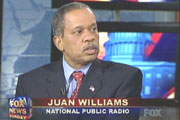 Juan Williams: "On this point, though, this culture of life point, if there's one deficit in what John Paul II did, in terms of his legacy, you'd have to come back to this idea that in an age of AIDS, he was very slow to respond on the issue of condoms, on the issues of what rights gays should have in society. And I think women around the world, but especially here in the United States, will have questions in their mind about the fact that he was so strongly opposed to their ordination, while that issue really, in the rest of the Christian church, has become something more, more welcoming."
Juan Williams: "On this point, though, this culture of life point, if there's one deficit in what John Paul II did, in terms of his legacy, you'd have to come back to this idea that in an age of AIDS, he was very slow to respond on the issue of condoms, on the issues of what rights gays should have in society. And I think women around the world, but especially here in the United States, will have questions in their mind about the fact that he was so strongly opposed to their ordination, while that issue really, in the rest of the Christian church, has become something more, more welcoming."
Moderator Chris Wallace: "On the other hand, on a trip to San Francisco, when people weren't doing it, he cradled an AIDS baby and held it at a time when people were afraid of touching anyone with AIDS."
Williams: "No, that's absolutely right. It's not a matter of his compassion. It's a question then of church teachings and how church teachings are interpreted, especially with the use of condoms in an age of AIDS. It's just hard for me to, well, you know, I think that's more work for the next Pope."
  Welch Shoots Down Couric's Admiration Welch Shoots Down Couric's Admiration
for European Work Ethic
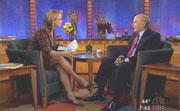 Katie Couric's admiration for Europe shot down by Jack Welch. During an interview on Monday's Today with former GE Chairman Jack Welch, on to plug his new book, Winning, Couric complained that Americans are overworked and asked: "I mean is there something wrong with this picture? Are we too obsessed with work because the Europeans sure have a very different attitude don't they?" Welch retorted: "And, and their economy is some trouble. And I don't think people are obsessed with this in China right now and, and you just came back from China. You, you didn't see a lack of work ethic there, I'm sure."
Katie Couric's admiration for Europe shot down by Jack Welch. During an interview on Monday's Today with former GE Chairman Jack Welch, on to plug his new book, Winning, Couric complained that Americans are overworked and asked: "I mean is there something wrong with this picture? Are we too obsessed with work because the Europeans sure have a very different attitude don't they?" Welch retorted: "And, and their economy is some trouble. And I don't think people are obsessed with this in China right now and, and you just came back from China. You, you didn't see a lack of work ethic there, I'm sure."
The MRC's Geoff Dickens caught the exchange from the in-studio session which was aired during the 7:30 half hour of the April 4 Today:
Couric: "Let's talk about the work/life balance because as you mention a lot of people, when you speak, I mean I get that question all the time. How do you balance it all? A family and demanding job. What is your best advice in this department? I'm just curious because I've been doing some pieces on Overworked In America. The fact that so many Americans feel overworked and I have, what, I have a statistic 30 percent do not take their full vacation. I mean is there something wrong with this picture? Are we too obsessed with work because the Europeans sure have a very different attitude don't they?"
Welch: "And, and their economy is some trouble. And I don't think people are obsessed with this in China right now and, and you just came back from China. You, you didn't see a lack of work ethic there, I'm sure."
Couric: "No."
For Amazon.com's page on Welch's new book, Winning, go to: www.amazon.com
-- Brent Baker

Home | News Division
| Bozell Columns | CyberAlerts
Media Reality Check | Notable Quotables | Contact
the MRC | Subscribe
|























 Network evening newscasts rarely cite polls other than their own, but on Monday's CBS Evening News Bob Schieffer touted an AP/Ipsos poll which, he reported, found that "American Catholics hope whoever succeeds the Pope will make some changes in the church." Schieffer proceeded to cite majority support for allowing priests to marry and the ordaining of women as priests.
Network evening newscasts rarely cite polls other than their own, but on Monday's CBS Evening News Bob Schieffer touted an AP/Ipsos poll which, he reported, found that "American Catholics hope whoever succeeds the Pope will make some changes in the church." Schieffer proceeded to cite majority support for allowing priests to marry and the ordaining of women as priests.  Schieffer announced on the April 4 CBS Evening News, over graphics displaying the three poll numbers he cited: "American Catholics hope whoever succeeds the Pope will make some changes in the church. An Associated Press poll out today says that 63 percent of American Catholics say the new Pope should give lay people a greater say in running the church; 60 percent say the new Pope should allow priests to marry; the same number support ordaining women as priests."
Schieffer announced on the April 4 CBS Evening News, over graphics displaying the three poll numbers he cited: "American Catholics hope whoever succeeds the Pope will make some changes in the church. An Associated Press poll out today says that 63 percent of American Catholics say the new Pope should give lay people a greater say in running the church; 60 percent say the new Pope should allow priests to marry; the same number support ordaining women as priests." 

 The ideological labeling of a potential new Pope has begun. On Monday's Good Morning America, ABC's Charles Gibson asserted that Cardinal Joseph Ratzinger holds "extreme conservative views." CNN's Paula Zahn didn't even wait until the Pope had died before speculating about his replacement. On Friday night, before warning that it's "very likely that the next Pope will share Pope John Paul II's conservative stances on issues like abortion and the role of women in the church," she tagged Cardinal Francis Arinze as a "staunch conservative" and reported that "Cardinal Tettamanzi, the Archbishop of Milan, is also close to Opus Dei, the ultra-conservative Catholic group."
The ideological labeling of a potential new Pope has begun. On Monday's Good Morning America, ABC's Charles Gibson asserted that Cardinal Joseph Ratzinger holds "extreme conservative views." CNN's Paula Zahn didn't even wait until the Pope had died before speculating about his replacement. On Friday night, before warning that it's "very likely that the next Pope will share Pope John Paul II's conservative stances on issues like abortion and the role of women in the church," she tagged Cardinal Francis Arinze as a "staunch conservative" and reported that "Cardinal Tettamanzi, the Archbishop of Milan, is also close to Opus Dei, the ultra-conservative Catholic group." 
 Hours before Pope John Paul II died on Saturday, NBC's Today devoted a segment to condemning his tenure for alienating, maginalizing and dividing the Catholic church in the U.S. Co-host Lester Holt charged that "some believe his unyielding stand," in refusing "to even discuss" opening the priesthood to married men and women, "alienated American Catholics." Holt insisted that "within the hierarchy, more progressive voices have been marginalized" and argued: "Pope John Paul II's legacy in the world's most powerful country may be that of a house divided. A man who changed the world, but in many ways, was unwilling to change his church."
Hours before Pope John Paul II died on Saturday, NBC's Today devoted a segment to condemning his tenure for alienating, maginalizing and dividing the Catholic church in the U.S. Co-host Lester Holt charged that "some believe his unyielding stand," in refusing "to even discuss" opening the priesthood to married men and women, "alienated American Catholics." Holt insisted that "within the hierarchy, more progressive voices have been marginalized" and argued: "Pope John Paul II's legacy in the world's most powerful country may be that of a house divided. A man who changed the world, but in many ways, was unwilling to change his church." 
 MSNBC's Chris Matthews launched a rant Saturday night from Rome about how the Catholic church must approve of using condoms. Citing the affliction of AIDS in Africa, Matthew proposed: "I'm telling you, a new Pope is going to have to grab that one and grab it hard, and he's got to get to people and say, 'You may not like condoms, they may not be, but they're a lot better than HIV AIDS.'" Matthews acknowledged that "I'm not speaking as a journalist, I guess, for a second," as if it were unusual for him to offer a personal opinion, as he added that "I shouldn't be giving editorials." On Fox News Sunday, NPR's Juan Williams echoed Matthews: "There's one deficit in what John Paul II did, in terms of his legacy, you'd have to come back to this idea that in an age of AIDS, he was very slow to respond on the issue of condoms, on the issues of what rights gays should have in society."
MSNBC's Chris Matthews launched a rant Saturday night from Rome about how the Catholic church must approve of using condoms. Citing the affliction of AIDS in Africa, Matthew proposed: "I'm telling you, a new Pope is going to have to grab that one and grab it hard, and he's got to get to people and say, 'You may not like condoms, they may not be, but they're a lot better than HIV AIDS.'" Matthews acknowledged that "I'm not speaking as a journalist, I guess, for a second," as if it were unusual for him to offer a personal opinion, as he added that "I shouldn't be giving editorials." On Fox News Sunday, NPR's Juan Williams echoed Matthews: "There's one deficit in what John Paul II did, in terms of his legacy, you'd have to come back to this idea that in an age of AIDS, he was very slow to respond on the issue of condoms, on the issues of what rights gays should have in society."  Juan Williams: "On this point, though, this culture of life point, if there's one deficit in what John Paul II did, in terms of his legacy, you'd have to come back to this idea that in an age of AIDS, he was very slow to respond on the issue of condoms, on the issues of what rights gays should have in society. And I think women around the world, but especially here in the United States, will have questions in their mind about the fact that he was so strongly opposed to their ordination, while that issue really, in the rest of the Christian church, has become something more, more welcoming."
Juan Williams: "On this point, though, this culture of life point, if there's one deficit in what John Paul II did, in terms of his legacy, you'd have to come back to this idea that in an age of AIDS, he was very slow to respond on the issue of condoms, on the issues of what rights gays should have in society. And I think women around the world, but especially here in the United States, will have questions in their mind about the fact that he was so strongly opposed to their ordination, while that issue really, in the rest of the Christian church, has become something more, more welcoming." 
 Katie Couric's admiration for Europe shot down by Jack Welch. During an interview on Monday's Today with former GE Chairman Jack Welch, on to plug his new book, Winning, Couric complained that Americans are overworked and asked: "I mean is there something wrong with this picture? Are we too obsessed with work because the Europeans sure have a very different attitude don't they?" Welch retorted: "And, and their economy is some trouble. And I don't think people are obsessed with this in China right now and, and you just came back from China. You, you didn't see a lack of work ethic there, I'm sure."
Katie Couric's admiration for Europe shot down by Jack Welch. During an interview on Monday's Today with former GE Chairman Jack Welch, on to plug his new book, Winning, Couric complained that Americans are overworked and asked: "I mean is there something wrong with this picture? Are we too obsessed with work because the Europeans sure have a very different attitude don't they?" Welch retorted: "And, and their economy is some trouble. And I don't think people are obsessed with this in China right now and, and you just came back from China. You, you didn't see a lack of work ethic there, I'm sure."